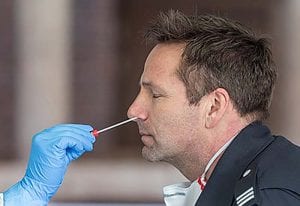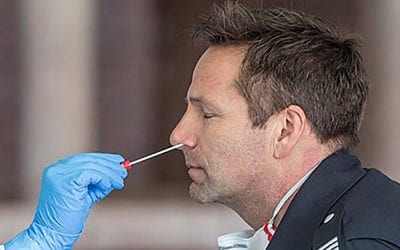With COVID regulations regularly changing across the globe, travelers must prep for international trips to save themselves time and cash.

The first question can be answered in large part by a single word — “research” — although I have specific recommendations below.
Unfortunately for travelers, the second answer is yes. Countries can change their laws and regulations anytime they deem necessary. Countries don’t have to make exceptions for anyone, including those who are already on their journey. France, for example, recently changed its COVID-19 testing rules for travelers and gave just a few days of notice of the new rules. I have a friend in the UK who didn’t have time to meet the new requirements. He postponed his trip for a few days, which cost him in his wallet.
With the emergence of the COVID Omicron variant, nations are adding new COVID laws and regulations almost daily.
These days, travel has a constantly changing pandemic landscape. With the emergence of the COVID Omicron variant, new laws and regulations are being written across the globe almost daily. Definitions, COVID testing, vaccination and documentation requirements are changing every day. International travel was never easy. Now it’s harder and more uncertain.
A requirements checklist is an essential tool for travelers to keep a record of international entry requirements and track their fulfillment.
I highly recommend researching COVID and general entry requirements thoroughly for all your destinations and making a requirements checklist to help you track every international requirement you need to meet, plus your progress toward meeting them. Start the checklist the moment you begin planning your trip.
Not all COVID tests are the same and if you can use COVID home test kits, make sure you buy enough to retest, as they sometimes fail.

Most every country in the world requires some kind of negative COVID test prior to your departure to their nation. You need to know what kind of tests are permitted and the tests’ timing requirement. Some countries require multiple tests. Be aware that test requirements for children and adults may differ.
Not all COVID tests are the same. Many countries permit both RT-PCR and antigen tests. PCR tests take more time to get the results unless you pay for expedited service, if available. Some countries permit self administered antigen home kit tests, while others, like the U.S., require them to be supervised and analyzed by medical professionals. You must ensure that you take an acceptable test or your trip might end before it starts.
If you’re using a home test kit, buy more than one per traveler, as sometimes they fail to give a result, forcing you to retest. If your test needs supervision, make sure you’ll have Internet access so you can contact the supervising professional.
Make sure you understand COVID testing deadlines or your trip may end before it begins.
Travelers must be cognizant of their test deadline time frame. Deadlines may be expressed in days or hours. Deadlines may be at departure or upon arrival. Carefully count backward from the deadline to determine when to take the appropriate test. Know if the rules are flexible if trip delays occur. Be prepared for retesting in case of a lengthy delay, no matter what. Try to time your test to give yourself leeway in case of a short delay.
COVID-19 test required to return home:
Many nations, like the U.S., require their own citizens and legal residents to be tested for COVID prior to returning home. The rules may be different than for visitors. Be aware of the specific rules pertaining to your return home.
COVID-19 test appointments:
Due to testing deadlines, testing is time-sensitive. Test appointments, if necessary, may not be easy to obtain at the specific time you need them. If you need a test appointment in advance, start trying to obtain an appointment the moment you know the timing of your itinerary.
COVID-19 home test kit shortages:
Currently in the U.S., for example, there are COVID home test kit shortages. Once you book your trip, if you can use a home test kit, with or without supervision, locate the necessary test kit and purchase it early to ensure you have it. Purchase at least one extra kit in case of kit problems so you can retest. Make sure your test kits won’t expire before you need to use them.
Budget at least $500 per traveler for COVID testing:
Rules may change. You may need retesting or in-person testing. Especially away from home that can be costly, in large part because you’ll likely need to purchase an expedited test to meet your test deadline.
Quarantine:
If you test positive while on your trip, you’ll need to quarantine or isolate. Have a plan in place in case you test positive. You’ll need to arrange for new transportation, a place to stay, meals, medication, physician consultation, etc.
Along with COVID test and vaccination documents, as in years past you’ll also need a valid passport and potentially a visa and other documentation. Discover this as you prep for international trips.
Identity documentation:
Even during the pandemic you’ll still need the same documents to travel internationally as before, such as a passport. You may need a visa for some locations. In lieu of a visa, you may be able to register via an electronic advanced registration system for visitors. Those requirements remain in place. You’ll need to meet standard visitor requirements in addition to the new COVID requirements as you prep for international trips.
COVID documentation:
Whether your destination requires you to be fully vaccinated or not, bring your national vaccination certificate in the original form. If it’s a paper form, I recommend you scan it and save the scan in your smartphone for quick, easy retrieval, but bring the paper certificate, too. If you’re recently recovered from COVID, bring the documentation for that according to your destinations’ requirements and your home country. You may need a COVID pass from your destination to freely move about there. Find out what’s required for it and ensure you have it with you.,
The definition of “fully vaccinated” varies from nation to nation.
Fully vaccinated:
The definition of “fully vaccinated” varies from nation to nation. Some nations require all visitors are fully vaccinated for entry, which includes having had a booster inoculation. Make sure you fulfill your destinations’ vaccination requirements per their definition as you prep for international trips.
Travel Health Insurance:
During the pandemic, you don’t want to be without health insurance at your destination(s). That may mean buying travel health insurance for your trip. This is particularly essential if you become infected with COVID during your trip. Make sure the insurance will cover COVID.
Assume the rules and requirements will change:
In recent months, many nations have significantly modified their COVID rules a number of times, in large part due to concerns over the new COVID Omicron variant. As mentioned above, the new rules even affect those already traveling. To successfully negotiate the complexities of international travel during the pandemic you must assume rules will change while you’re away from home. You’ll need to monitor the situation to be aware of changes and be prepared to fulfill them.
International travel wasn’t ever easy at many destinations throughout the world. During the pandemic, especially with the uncertainty of Omicron, it’s harder now and far more changeable. Be prepared for anything.
READ ALSO:
How self-insurance can help with COVID-19 travel problems
Why do I need a disaster emergency travel kit?
After many years working in corporate America as a chemical engineer, executive and eventually CFO of a multinational manufacturer, Ned founded a tech consulting company and later restarted NSL Photography, his photography business. Before entering the corporate world, Ned worked as a Public Health Engineer for the Philadelphia Department of Public Health. As a well known corporate, travel and wildlife photographer, Ned travels the world writing about travel and photography, as well as running photography workshops, seminars and photowalks. Visit Ned’s Photography Blog and Galleries.




